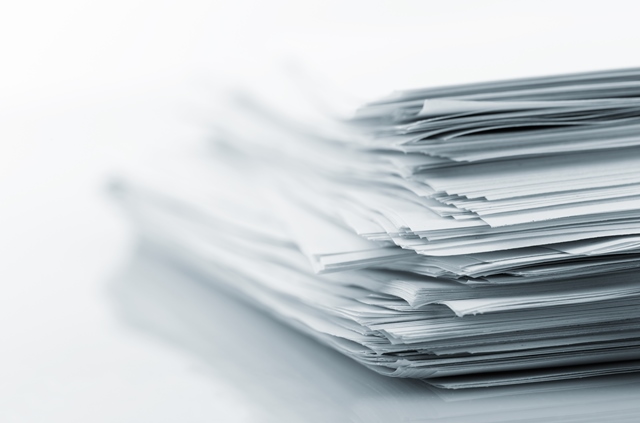across-the-desk-an-editors-guide-to-peer-review-best-practice
February 12, 2015
Considering the journal level: As a minimum, peer reviewers are asked to check the correctness of the work: whether the premise is well founded, whether the hypotheses are appropriately addressed, and whether the conclusions are supported by the data. However, many journals also request a more subjective assessment of the article's suitability for a journal, normally based on the level of the journal and on the target audience (e.g., niche readership versus broad and heterogeneous readership). As many chemistry journals receive so many manuscripts these days that they can only accept a small portion, editors often state directly in the review invitation that they can only accept the top xx% of manuscripts or that their rejection rate is currently xx%. These guidelines are especially helpful for a journal that you might not have worked with before. At a minimum, the work must be correctly done, but editors are also looking for your assessment of whether the work’s importance justifies publication in the journal to which it was submitted.
Having to decline: As a reviewer, you should respond to every invitation to peer review. This is not just a matter of etiquette, but part of the ethical guidelines followed by many journals. If you must decline a peer-review invitation because of different subject expertise or lack of time, a simple reply saves everyone time and especially benefits the author. If an author's manuscript is sitting with reviewers who have not responded to the peer-review request, the author will not get a timely decision...
Improving the manuscript: Peer review not only helps the editor make a decision on acceptance or rejection, but serves the greater purpose of improving the overall quality of the manuscript. Even if a manuscript is rejected, it should be improved by the peer-review and decision process. Thus, when supplying a review, the most helpful comments are those that point out unclear assertions or holes in the article's argumentation and then offer constructive ways to better communicate the findings in the article.
"One-liners": Every peer reviewer should explain or support his/her judgments. However, some reports are submitted with only short comments such as "This is an inferior manuscript. Reject" or “Great work. Publish” with no further explanation. As a reviewer, consider how the author could use this comment to improve the manuscript. I like to ask potential reviewers how they would view the same comment if they had received it for one of their own papers, especially if the reviewer suggests rejection. Even a positive one-liner such as "Nice article, should be published as is" deserves some supporting statements (e.g., what is nice about the article?).
Source: wavebreakmedia/Shutterstock
Science vs. language: Unfortunately, not every submitted manuscript is well-written. What should reviewers do if they cannot assess the scientific merit of an article because they can’t understand the text? If the article is incomprehensible, there is not much a reviewer can do but suggest rejection on that basis. However, if you can understand the basic message, see if you can guide the authors on what improvements are needed. Are there certain aspects that could be communicated better, such as parts of the discussion? Should the authors consider resubmitting to the same journal after language improvement? Would you consider looking at the paper again?
Literature citations: It is generally not expected that a reviewer know the exact details of every literature reference listed in an article. However, every article should contain a well-balanced list of references that is helpful to the reader, is fair to competing authors, and gives due recognition to the initial discoveries and related work that led to the work under assessment. Every reviewer, even without looking up every reference, should be able to evaluate whether these qualities are met. One thing to look out for is self-citation. If authors focus too much on citing their own work, it may be a sign that they are not giving due credit to others' works, or that the reported work has a narrow readership.
To delegate or not to delegate: When you receive a peer-review request, it is because the editor feels that you have the right expertise and broad enough knowledge of an area to fairly assess a manuscript. If you are going to delegate to a colleague or member of your group, it is expected that you have carefully considered whether this person also has the breadth of experience to handle the evaluation fairly and competently. Journals have varying policies on whether permission is needed for delegating (it will often be stated in the review request), but you should notify the editor at a very minimum. Delegation without notifying the editor is against most ethical guidelines. A further option is to decline the peer-review request, but to nominate a colleague for the editor to invite directly. This option is especially good for giving up-and-coming researchers in your group some direct experience with the process.
Conflict of interest: What if the author is a good friend (or competitor)? Many reviewers will know the author if they research in a similar area. A reviewer can certainly give a fair assessment of an article that is written by a friend or competitor, but any significant conflict of interest should be revealed to the editor. If the conflict of interest causes a large positive or negative bias, then it is better to decline the review request. Every editor will appreciate an honest statement about a conflict of interest, even if he/she then has to look for a replacement reviewer.
Personal criticism: Peer review for most international chemistry journals is conducted on a single-blind basis, meaning that the reviewer can immediately see the name of the author/s. Reviewers are asked to make every effort to ensure that they only judge the article content and not the person who wrote it. The editor may filter out reports that contain significant personal criticism, and an author is generally more open to the suggestions when the report addresses the scientific content on a neutral basis.
Source: Getty Images/ iStockphoto
Anonymity: Some peer reviewers have asked whether it is acceptable to tell an author they know well that they are currently reviewing their manuscript. Strictly speaking, sharing this information is breaking the confidentiality of the peer-review request. A larger problem is that it can entice the authors, whether consciously or subconsciously, to try to influence your assessment before you have submitted the report. However, for most journals, it is acceptable to reveal your identity voluntarily within the report itself so that the author will see it when receiving the decision. Otherwise, your identity is kept completely anonymous.
Plagiarism? If you suspect plagiarism, including self-plagiarism, during peer review but cannot find the source or specify exactly what is being plagiarized, simply notify the editor of your suspicion even if you are not 100% sure. Most editors have access to software that can check for plagiarism (though such software is generally used only when there is concrete suspicion). Editors are not out to police every paper, but if such cases of plagiarism can be discovered during peer review, they can be properly addressed ahead of publication. After publication, the consequences are worse for both authors and readers because a retraction may have to be carried out.
Ask the editor: While reviewing a manuscript, you may lack information that you need for conducting a proper evaluation - missing CIF files for crystal structures, for instance or an NMR spectrum that is necessary to check the author's interpretation of a product. Remember the editor’s role is to ensure a smooth peer-review process, so don’t hesitate to ask the editor to help supply missing info. Your request is also helpful toward improving the manuscript because the authors can consider expanding their Supporting Information file.
The tips above give one editor's point of view, but are not meant to replace the more specific considerations of the ethical guidelines that are followed by each journal. Wiley also published the second edition of its Best Practice Guidelines on Publishing Ethics last year, which offer useful guidance on peer review. Major journals such as Angewandte Chemie International Edition, Chemistry-An Asian Journal, The Chemical Record, as well as all journals of ChemPubSoc Europe (CPSE) and the Asian Chemical Editorial Society (ACES) follow the guidelines published by the European Association of Chemical and Molecular Sciences (EuCheMS). The ethical guidelines of EuCheMS are included in their list of publications here.
World records in chemistry: www.tcr.wiley-vch.de/records, and on ChemistryViews
Nozoe Autograph Books: www.tcr.wiley-vch.de/nozoe
Facebook: www.facebook.com/ChemicalRecord
Twitter: www.twitter.com/ChemRec













